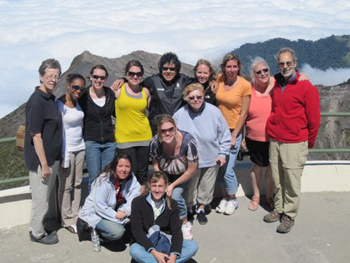Universal Health Care, Clean Drinking Water Issues for Public Health Week
 |
Students and faculty from the University at Albany's School of Public Health visit Costa Rica to learn about universal health care and clean water issues confronting the nation's smaller villages. |
When Ngobe indigenous people say hello, it translates roughly into "I'll carry you in my dreams." As UAlbany students discovered first hand, those dreams are likely to include access to clean drinking water.
UAlbany students learned about a successful system for potable drinking water in one Ngobe village in Costa Rica over winter break.
On April 9, UAlbany's celebration of Public Health Week will include a seminar on recent student experiences in Costa Rica.
"Given the debate over health care reform in this country, we were eager to visit a country which had made some very concrete decisions about its health care system," said Carol Whittaker, director of the Center for Global Health and one of three School of Public Health faculty members on the trip.
Costa Rica, a middle-income country known for universal health care as well as for its protected national forests and beautiful beaches, is more recently gaining the spotlight as a center for medical tourism. According to Whittaker, tourists now visit to receive elective surgery, as well as to enjoy the mountains and beaches.
"In Costa Rica we were provided the opportunity to learn about the infrastructure of the country's healthcare system," said Jennifer Saad, a second-year graduate student in epidemiology from Woodstock, Conn. "The trip was a rewarding opportunity, as it further enhanced our understanding of global health through hands-on and personal experience."
Students also saw firsthand how access to clean water cannot be taken for granted. They traveled by bus from San Jose to Coto Brus, the province in the south along the border with Panama. Then the students traveled in a rustic wagon up the mountain, to the Ngobe indigenous reserve, to learn about one village's system of providing clean drinking water.
Lack of access to potable water is an issue for the Ngobe people who live in scattered villages high in the mountains. It is also a major public health issue in many other parts of the world.
"Our trip to Costa Rica was an educational, beautiful, and once in a lifetime experience which I am thankful to be a part of," said Vanessa DeYulius, a second-year graduate student in Social Behavior and Community Health from Cresson, Pa.
Sample of Public Health Week Events
A Healthier America: One Community at a Time
All events are at the School of Public Health in the George Education Building on the East Campus, 1 University Place, Rensselaer, along the Columbia Turnpike (Routes 9 and 20) in East Greenbush.
April 7 � Community Engagement Meeting, 12-3 p.m., Room 110A. Speakers include Janine Jurkowski, Jean Moore, and student Erin Eisenhardt.
April 8 � the School of Public Health's first-ever Volunteer Fair, 9 a.m.-12 p.m., Room 110A.
April 8 � Rainbow Access Initiative, 12-1:30 p.m., Classroom 3.
April 8 - Webcast on A Growing Hunger, 4-5:30 p.m., Room 110A. Features a panel of national experts on food issues, including food safety, menu labeling and food marketing. Ned Baker, speaker.
April 9 � Global Seminar, Costa Rica Experiences, 12-1 p.m., Room 110A, led by SPH students Jennifer Saad and Jessica Quinn.
April 9 � MPH First-Year Seminar, Health Care Reform, led by Tim Hoff, 1:30-2:30 p.m., auditorium.
![]() For more news, subscribe to UAlbany's RSS headline feeds
For more news, subscribe to UAlbany's RSS headline feeds


